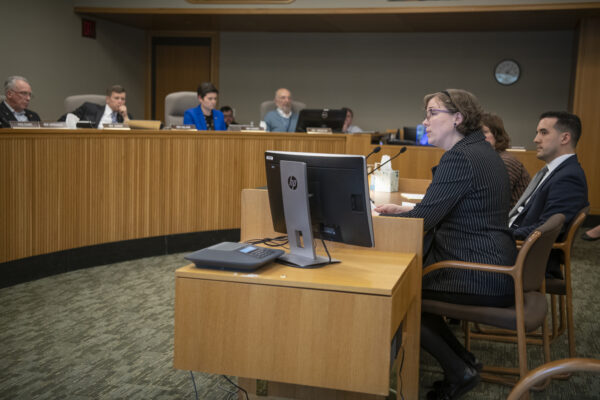PORTLAND, Ore. – The ACLU of Oregon, Disability Rights Oregon, a former prosecutor, and two state legislators were among those who testified at the Oregon Capitol today in support of House Bill 3224, calling on the Oregon Legislature to require all 36 Oregon district attorneys to have written policies that guide their work.
HB 3224 is in response to a new report released by the ACLU of Oregon that found that at least 40 percent of Oregon’s District Attorneys do not have internal written policies to guide their core work within the justice system.
“District attorneys are the most powerful actors in the criminal justice system and Oregon law provides DAs with enormous discretion to make decisions about who and how people are prosecuted,” said david rogers, executive director the ACLU of Oregon. “The lack of written policies among Oregon’s DA offices is deeply troubling, particularly when you consider the critical role DAs play in the justice system.”
The report, A Peek Behind the Curtain: Shining Some Light on District Attorney Policies in Oregon, is the result of more than two years of research by the ACLU of Oregon. Research began in November 2016, when the ACLU of Oregon submitted public records requests to all 36 of Oregon’s district attorney offices in order to better understand what policies shaped their work.
In response, the House Judiciary Committee held a hearing on HB 3224 to consider creating a basic standard for transparency and accountability for Oregon’s DA offices, requiring every district attorney to have written policies for the core functions of their office and make them available to the public.
Testifying in support of the bill were Kimberly McCullough, ACLU Policy Director; Sarah Radcliffe, managing attorney for Disability Rights Oregon; Edward Kroll, a former prosecutor and current defense attorney; Rep. Carla Piluso, District 50 representative and a former Gresham Police Chief; Rep. Jennifer Williamson, House Majority Leader; and more advocates for transparency in Oregon’s justice system.
“District Attorneys play a crucial role in our criminal justice system,” said Rep. Piluso, who sponsored HB 3224. “DAs make choices on a daily basis about who to charge and what they’re charged with; which offenders get access to treatment and diversion programs; which victims get access to services and support; and a thousand other small decisions that add up to whether our criminal justice system is fair to every Oregonian.”
“Policies that guide the work in district attorney’s offices matter,” rogers added. “The choices that individual DAs make about how their offices are run and how their prosecutors operate profoundly impact the lives of Oregonians.”
Other key findings from the ACLU of Oregon’s newly-released report:
- Only 13 DA offices demonstrated that they have a meaningful set of written policies for the core functions of their office, providing at least some guidance about how they and their staff are handling their core duties as prosecutors in Oregon.
- 11 DA offices refused to respond to at least one of ACLU of Oregon’s requests for basic information and did so in direct violation of the state’s public records law.
- While 40 percent of the district attorney offices acknowledged they have no internal written policies, this number may be higher because several offices didn’t respond at all.
- Several district attorneys shared disbelief that office policies are actually needed, making the argument that the law provides a sufficient guide to their work.
“This report is a call to action to Oregon’s legislature,” added rogers. “Oregonians deserve greater transparency and accountability in our criminal justice system. Mandating basic and transparent policies for every DA office is an essential step toward modernizing our justice system. Our state’s criminal justice system should reflect current best practices to improve outcomes for Oregonians. This shouldn’t be seen as a luxury.”
ACLU recommends that every district attorney office in Oregon have a basic set of policies that guide its core functions. These policies serve many critical purposes including:
- To ensure there is continuity to how staff in DA offices prosecute people.
- To set standards for behavior and expectations on critical issues where there is no guiding law.
- To provide clarity of expectations and critical information for other justice system stakeholders, victims, defendants, and the public at large · To create mechanisms of accountability for themselves and their staff to adhere to.
- To clarify how a particular office will use its discretion based on the DA’s values, priorities, and understanding of the most effective public safety strategies
Full report: The complete report can be found here.
Research records: ACLU has made available every document from the research available to the public here.
Stay Informed
Sign up to be the first to hear about how to take action.
By completing this form, I agree to receive occasional emails per the terms of the ACLU’s privacy statement.
By completing this form, I agree to receive occasional emails per the terms of the ACLU’s privacy statement.

